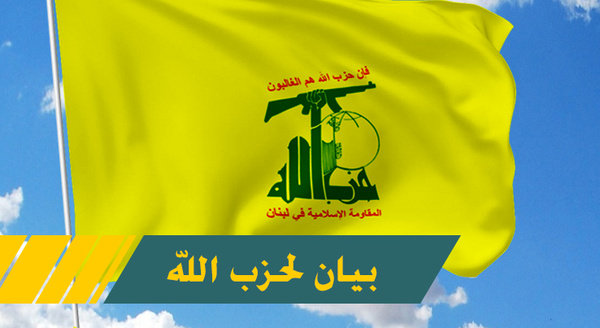
Beirut – Saba:
Hezbollah condemned the Lebanese government’s decision under Prime Minister Nawaf Salam to disarm the resistance against Israeli occupation, calling it a grave sin and a clear violation of the government’s ministerial statement and the national pact.
The party stressed that the decision fully serves Israeli interests, while reaffirming openness to dialogue aimed at ending Israeli aggression and liberating Lebanese lands.
In an official statement, Hezbollah said Salam’s government has “committed a major sin by stripping Lebanon of the resistance’s arms, weakening Lebanon’s position against ongoing Israeli-American aggression.”
The statement added that the decision “achieves for Israel what it failed to do in its aggression on Lebanon,” referencing the 2006 war where Lebanon faced Occupation in the “First Battle of Determination,” resulting in Israel’s withdrawal and a ceasefire agreement.
Hezbollah pointed out the decision breaches the National Pact and the government’s ministerial declaration, which in clause five commits the government to “take all necessary measures to liberate Lebanese territory from Israeli occupation and extend state sovereignty using its own forces exclusively, deploying the Lebanese Army along internationally recognized borders.”
The statement emphasized the importance of preserving Lebanon’s strength, including the resistance’s weaponry, alongside strengthening and arming the Lebanese Army to expel the Israeli enemy and protect Lebanon’s sovereignty.
The decision, Hezbollah said, resulted from pressure from the U.S. envoy Dorothy Shea and was justified by Prime Minister Salam as a step to continue discussion of the U.S. plan, including plans for the Lebanese Army to inventory weapons by year-end.
Hezbollah condemned the decision as “fully serving Israel’s interests and leaving Lebanon exposed without deterrence.”
The party criticized the government for ignoring President Michel Aoun’s oath commitment to discuss a comprehensive national security and defense strategy aimed at removing Israeli occupation, calling the government’s decision a “strategy of surrender and a blatant erosion of Lebanon’s sovereignty.”
Hezbollah noted that the withdrawal of its ministers and Amal Movement ministers from the cabinet session was a rejection of the decision and a reflection of widespread popular and societal opposition across Lebanon’s sects and parties to subjecting Lebanon to U.S. tutelage and Israeli occupation.
The statement declared that this decision “nullifies Lebanon’s sovereignty and enables Israel to tamper with Lebanon’s security, geography, politics, and future,” vowing to treat the decision as non-existent.
Simultaneously, Hezbollah affirmed its openness to dialogue, ending Israeli aggression, liberating Lebanese lands, securing the release of prisoners, rebuilding war-damaged areas, and discussing a national security strategy — but not amid ongoing aggression.
The party called on Occupation to implement the relevant agreements first and urged the government to prioritize “all necessary measures to liberate Lebanese territory” as stated in its ministerial declaration.
Hezbollah reassured supporters that “this is a passing cloud, and we are accustomed to patience and victory.”
Hezbollah condemned the Lebanese government’s decision under Prime Minister Nawaf Salam to disarm the resistance against Israeli occupation, calling it a grave sin and a clear violation of the government’s ministerial statement and the national pact.
The party stressed that the decision fully serves Israeli interests, while reaffirming openness to dialogue aimed at ending Israeli aggression and liberating Lebanese lands.
In an official statement, Hezbollah said Salam’s government has “committed a major sin by stripping Lebanon of the resistance’s arms, weakening Lebanon’s position against ongoing Israeli-American aggression.”
The statement added that the decision “achieves for Israel what it failed to do in its aggression on Lebanon,” referencing the 2006 war where Lebanon faced Occupation in the “First Battle of Determination,” resulting in Israel’s withdrawal and a ceasefire agreement.
Hezbollah pointed out the decision breaches the National Pact and the government’s ministerial declaration, which in clause five commits the government to “take all necessary measures to liberate Lebanese territory from Israeli occupation and extend state sovereignty using its own forces exclusively, deploying the Lebanese Army along internationally recognized borders.”
The statement emphasized the importance of preserving Lebanon’s strength, including the resistance’s weaponry, alongside strengthening and arming the Lebanese Army to expel the Israeli enemy and protect Lebanon’s sovereignty.
The decision, Hezbollah said, resulted from pressure from the U.S. envoy Dorothy Shea and was justified by Prime Minister Salam as a step to continue discussion of the U.S. plan, including plans for the Lebanese Army to inventory weapons by year-end.
Hezbollah condemned the decision as “fully serving Israel’s interests and leaving Lebanon exposed without deterrence.”
The party criticized the government for ignoring President Michel Aoun’s oath commitment to discuss a comprehensive national security and defense strategy aimed at removing Israeli occupation, calling the government’s decision a “strategy of surrender and a blatant erosion of Lebanon’s sovereignty.”
Hezbollah noted that the withdrawal of its ministers and Amal Movement ministers from the cabinet session was a rejection of the decision and a reflection of widespread popular and societal opposition across Lebanon’s sects and parties to subjecting Lebanon to U.S. tutelage and Israeli occupation.
The statement declared that this decision “nullifies Lebanon’s sovereignty and enables Israel to tamper with Lebanon’s security, geography, politics, and future,” vowing to treat the decision as non-existent.
Simultaneously, Hezbollah affirmed its openness to dialogue, ending Israeli aggression, liberating Lebanese lands, securing the release of prisoners, rebuilding war-damaged areas, and discussing a national security strategy — but not amid ongoing aggression.
The party called on Occupation to implement the relevant agreements first and urged the government to prioritize “all necessary measures to liberate Lebanese territory” as stated in its ministerial declaration.
Hezbollah reassured supporters that “this is a passing cloud, and we are accustomed to patience and victory.”